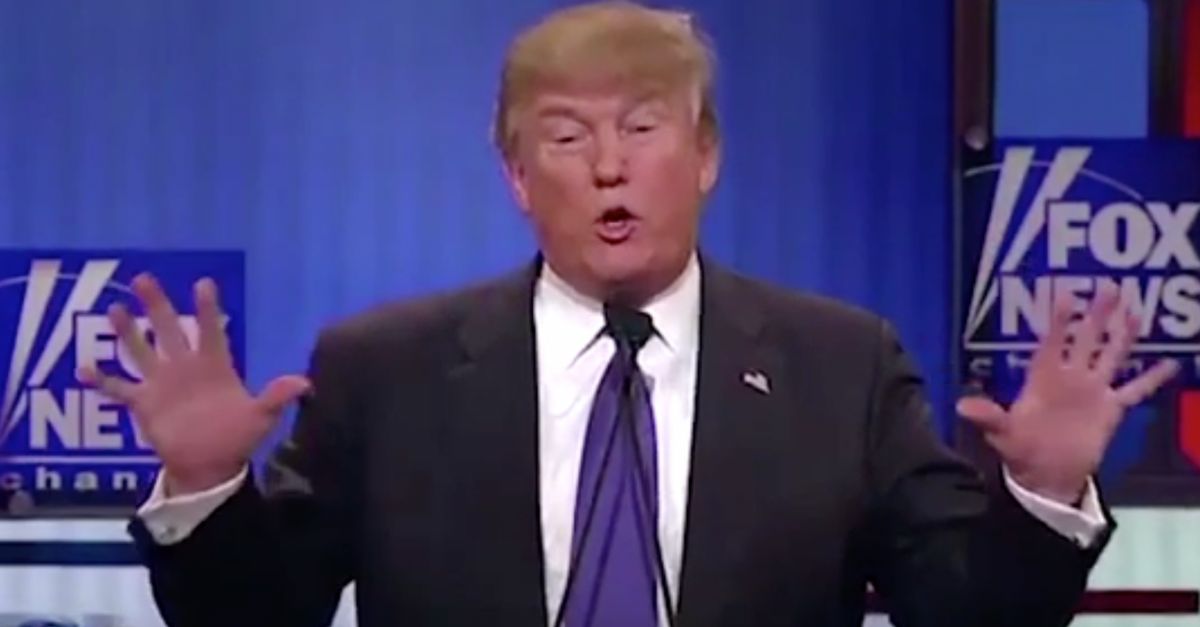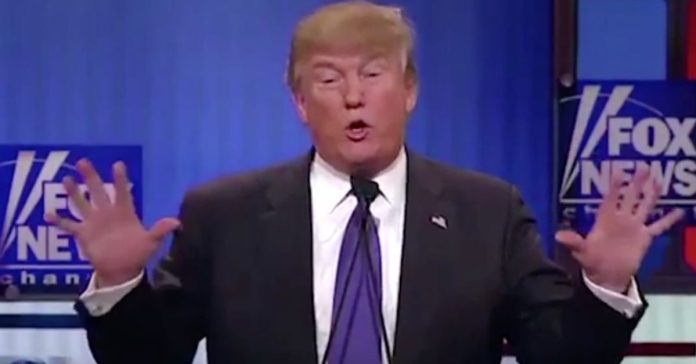
Donald Trump defends the size of his hands in an on-air debate with Sen. Marco Rubio, R-Fla., during the 2016 presidential campaign. (Screengrab via YouTube/ABC news).
The justices heard oral arguments Wednesday in Vidal v. Elster as they decide whether the phrase “Trump too small” should be given the same federal trademark protection as clothing brand name “FUCT,” band name “Thunderpussy,” or perhaps even the phrase “Trump is a Thief.” The justices appeared far more united than has been typical in recent memory, with most coalescing around a likely ruling against allowing the phrase to be trademarked.
During the 2016 presidential campaign, then-candidate Donald Trump began calling opponent Sen. Marco Rubio, R-Fla., “little Rubio.” In response, Rubio told a crowd that while his opponent was indeed taller, Trump had disproportionately small hands for a man his height. Rubio then joked, “And you know what they say about guys with small hands.”
The joke took hold and in 2017, California attorney and political activist Steve Elster tried to get the phrase “Trump too small” printed on T-shirts. The U.S. Patent and Trademark Office (USPTO) refused on the grounds that the Lanham Act does not permit the registering of any mark that “identif[ies] a particular living individual” without that person’s written consent.
Elster now argues that the provision is illegal viewpoint discrimination: because Trump could register this mark himself while Elster cannot, it follows that only messages approved by Trump (or theoretically, any other candidate) would get legal protection. To underscore the point, Elster notes in his filing that the office had allowed registration of “Joe 2020,” “Biden President,” and “Hillary for America,” but not to register “No Joe in 2024,” “Hillary for Prison 2016,” or “Impeach 46.” Therefore, Elster says, the proper test for constitutionality is strict scrutiny — the highest bar to clear.
Arguing to support the Trademark Office’s decision — and against Elster’s right to trademark the derogatory phrase — is the Biden administration. It says that the statute should not be considered a restriction on speech but a condition on a government benefit.
The case is yet another recent challenge to the USPTO’s refusal to register marks it considers “scurrilous.” In 2017, the Supreme Court held that the government violated the First Amendment by refusing to register “The Slants” as a mark that disparaged Asian Americans. Likewise, the Court ruled in 2019 that a clothing designer had the right to register the name brand “FUCT” (“Friends U Can’t Trust”) despite the potentially profane meaning — a ruling that paved the way for a similar win for girl-band Thunderpussy.
The justices engaged in a friendly round of nuanced arguments with Deputy Solicitor General Malcolm Stewart — whose appearance marked the 100th case Stewart argued before the Supreme Court. Both Justices Clarence Thomas and Ketanji Brown Jackson appeared receptive to Stewart’s contention that the office’s registration limitations were less about limiting free speech and more about setting rules for the receipt of economic benefits given by the government.
Jackson pressed Stewart on whether there might be some disparate impact that disfavored a certain viewpoint, but Stewart deftly parried that treating a consent requirement as viewpoint discrimination would be anomalous within the general context of intellectual property law.
Perhaps signaling that he favored siding with Stewart, Justice Samuel Alito called the case “quite unlike” the past cases the Court has considered regarding trademark registration.
Justice Neil Gorsuch raised an entirely separate legal theory whereby Stewart could still secure a win for the government. Gorsuch, ever the historian, said that even the earliest trademark statutes — as opposed to the 1946 Lanham Act — included a good deal of “content based” restrictions for trademarks such as those based on geographic locations, descriptive terms, and people’s names.
“Why not just look to the history here?” Gorsuch suggested to Stewart, who joked that he would be happy to accept the win regardless of legal route.
Justice Sonia Sotomayor bluntly dismissed any argument that the Patent Office’s restriction constituted an infringement on speech, explaining that Elster was not in any way prevented from selling shirts with his chosen message. Therefore, Sotomayor said, the government need only identify a rational basis for its actions, which is it has clearly done in this case.
Sotomayor said that even if trademark registration is not a “government subsidy,” such a characterization is not necessary in order to find the USPTO’s actions legal.
When attorney Jonathan Taylor approached the podium on Elster’s behalf, he appeared to make little headway with the high bench. The justices hammered Taylor with inquiries from all sides.
Sotomayor noted that Taylor conceded the point that trademark registration is a “government benefit” and summed up in her characteristic blunt style: “Trademark doesn’t stop you from selling anywhere as much as you want, you’re [just] getting the benefit of stopping others from competing with you.”
During Justice Elena Kagan’s colloquy, she went so far as to tell Taylor that while he might find ways to distinguish his case from adverse precedents, “what you can’t find is a case that supports your position.”
Jackson also rejected Taylor’s suggestion that free speech was at stake.
“Trademark isn’t about expression or ability to speak,” Jackson said, “it’s about preventing confusion.”
Jackson followed up by asking Taylor whether he had any statistics to back up the claim that trademarks that are critical are rejected more often than those that are complimentary.
Taylor offered only that self-mockery tends to be “an unusual thing” in the context of trademarks.
At the conclusion of the arguments, Chief Justice John Roberts praised Stewart’s “exemplary” work as Stewart became only the fourth person this century to meet the rare milestone of arguing 100 cases before the Court. Roberts joked about a case in which he and Stewart were adversaries 23 years ago, saying that when the Court ruled, Roberts was “just nine votes short of a unanimous result for my client.”
Although unanimous rulings from the high court are not unprecedented, neither are they commonplace. A 9-0 ruling that “Trump too small” does not deserve legal protection by a Supreme Court the former president once slammed as “gutless” would certainly be one for the legal history books.
Have a tip we should know? [email protected]

